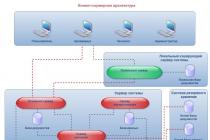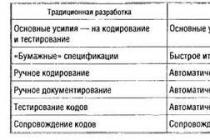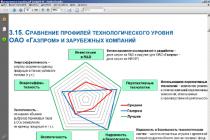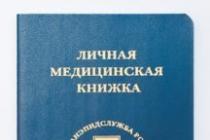In this article I will talk about such grounds for termination. employment contract as a single gross violation by an employee job duties. If an employee has grossly violated his labor duties, he may be dismissed under clause 6 of part 1 of article 81 of the Labor Code of the Russian Federation. Moreover, one single violation is enough for the termination of the contract to be possible.
The law refers to gross violations of labor discipline:
- absenteeism - that is, the absence of an employee at the workplace without good reasons during the entire working day (shift), regardless of its (her) duration, as well as in case of absence from the workplace without good reason for more than four hours in a row during the working day (shift);
- the appearance of an employee at work (at his workplace or on the territory of an organization - an employer or an object where, on behalf of the employer, the employee must perform labor function) in a state of alcoholic (narcotic or other toxic) intoxication;
— disclosure by an employee of secrets protected by law (including state, commercial, official and other), which became known to him in connection with the performance of his job duties, including disclosure of personal data of another employee;
- the commission by an employee at the place of work of theft (including small) property of others, its waste or deliberate destruction (damage), established by a court verdict that has entered into legal force or a decision of a judge, body, official authorized to consider cases of administrative offenses;
- a violation by the employee of labor protection requirements established by the commission (authorized) for labor protection - if the violation entailed serious consequences (accident at work, accident, catastrophe) or knowingly created a real threat of their occurrence.
The employer has the right to initiate the procedure for early termination of the employment contract in relation to one or another employee on the basis of documents proving the latter's guilt in the commission of actions (occurrence of circumstances) and, thus, making it possible to dismiss the guilty person. Documents confirming the guilt of the employee in the violation of labor duties can confirm:
- an act on the absence of an employee at the workplace. At the same time, the duration of continuous absence must be at least 4 hours in a row;
- a medical report on the results of the examination of an employee who appeared at work in a state of alcoholic (narcotic or other toxic) intoxication;
- conclusions from the results of the investigation (in necessary cases- with the application of materials of the investigation) of the fact of disclosure by the employee of a secret protected by law;
- a court verdict (decree of the body authorized to apply administrative penalties), which has entered into force and confirms the fact that the employee at the place of work has committed theft of property, its embezzlement or deliberate destruction (damage);
- conclusions based on the results of the investigation (in necessary cases - with the application of the materials of the investigation) of the fact of violation by the employee of labor protection requirements, which entailed serious consequences or knowingly created a real threat of such consequences.
All of the above documents must be properly completed. It is necessary to pay attention to the fact that dismissal on the grounds provided for in paragraph 6 of part one of Article 81 of the Labor Code of the Russian Federation is a disciplinary sanction and, therefore, when implementing the procedure for early termination of an employment contract, the employer must adhere to the procedure for applying disciplinary action defined by Article 193 of the Labor Code of the Russian Federation.
Let's take a closer look at each of the grounds for dismissal.
Subparagraph "a" of paragraph b clearly defines what should be considered absenteeism. However, the employer needs to pay attention to the fact that:
- suspension of work due to a delay in the payment of wages for more than 15 days is not considered absenteeism. In this case, the employee must notify the employer in writing in advance of his intentions;
- the employee has the right to refuse to perform work not stipulated by the employment contract. Therefore, his absence from the workplace for this reason is also not absenteeism.
If the employee decided to quit and without notifying the employer in writing in two weeks, he left workplace, the employer has the right to consider such actions as absenteeism.
The appearance of an employee at work in a state of intoxication (subparagraph "b" of paragraph 6) can be confirmed not only by a medical report. The evidence will be an act signed by two witnesses and a representative of the employer. The offender must also sign the document. However, if he refuses to sign, an appropriate entry must be made in the act. The employer is obliged to remove the violator from the performance of work (Article 76 of the Labor Code of the Russian Federation), i.e. prevent him from entering the workplace as soon as it becomes obvious, for example, for some specific outward signs that the latter has consumed alcohol (drugs, etc.).
In the event that the employee was not suspended from work, the responsibility for the possible consequences of the performance of work duties by him in a state of intoxication lies with the employer. In the future, the employee may be allowed to perform work as soon as the circumstances preventing this disappear. However, this does not deprive the employer of the right to dismiss the employee for gross violation of labor discipline. If, despite the testimony given in relation to the employee by other persons, the subsequent medical report does not confirm the fact of his intoxication, then the employer does not have the right to refuse the employee admission to the workplace.
Dismissal for disclosure by an employee of a secret protected by law (subparagraph "c" of paragraph 6 of article 81 of the Labor Code of the Russian Federation) is possible if:
1. An employment contract or other document, with which the employee was familiarized against signature, contains a condition on the inadmissibility of disclosure by the employee of information constituting a secret protected by law.
2. The relevant information was entrusted to the employee for the performance of the work assigned to him (labor function).
3. The fact that an employee disclosed relevant information - for example, personal data of another employee - is documented.
Early termination of an employment contract with an employee for theft or deliberate destruction of someone else's property at the workplace (subparagraph "d" of paragraph 6) is possible if his guilt is established. This can only be done by a court or body ( executive), which is entitled to apply administrative penalties. The basis for dismissal is the decision of the above bodies to hold the employee liable.
Please note: dismissal under subparagraph “d” of paragraph 6 is possible if the court verdict indicates that the perpetrator is sentenced to a punishment that does not exclude the possibility for the employee to perform his job duties.
This circumstance must be taken into account when issuing a dismissal order and making appropriate entries in the work book.
Dismissal under subparagraph "e" of paragraph 6 of Art. 81 of the Labor Code of the Russian Federation is possible if:
1. The employee was familiarized with the requirements for labor protection against signature.
2. The employer has provided the employee with safe working conditions that meet all the requirements of the law.
3. Violation by the employee of these requirements really entailed grave consequences or created a real threat to their occurrence.
4. The circumstances listed above are documented: an accident report at work, an expert opinion issued by authorized body, the decision of the state inspector for labor protection, etc.
An order (instruction) is issued by the employer on the dismissal of an employee. On its basis, other necessary documents are drawn up.
Clause 6, Part 1, Art. 81 of the Labor Code of the Russian Federation, there are five autonomous grounds for dismissal for a single gross violation of labor duties: “a) absenteeism; b) appearing at work in a state of alcoholic, narcotic or other toxic intoxication; c) disclosure of legally protected secrets; d) committing the theft of someone else's property at the place of work, its waste, deliberate destruction or damage; e) violation of labor protection requirements. Sitnikova E.G., Senatorova N.V. Termination of an employment contract at the initiative of the employer (clauses 1 - 6 of part 1 of article 81 Labor Code RF) // "Library" Russian newspaper", 2013, (issue 1), - P.11. Due to the fact that everything grounds listed there are measures of disciplinary responsibility, then dismissals on them, like any legal procedure strictly regulated by law. Let's take a look at each of these reasons.
1. “True absenteeism is the absence from the workplace without good reason throughout the working day (shift), regardless of its (her) duration, as well as the absence from the workplace without good reason for more than four hours in a row during the working day (shift).” Syrovatskaya L.A. points out that “truancy, giving the employer the right to dismiss an employee, is his absence without good reason at the workplace, and not at work. The workplace is considered to be the place where the employee must perform his labor function. For a turner, the workplace will be lathe. For the miller milling machine etc., and if the turner for more than four hours in a row during the working day was absent without good reason at his workplace, although he was on the territory of the enterprise all this time, the employer has the right to dismiss him on this basis ”Syrovatskaya L.A. . Labor law. Textbook - M .: " graduate School", 2012 - p.322..
When considering an individual labor dispute of an employee dismissed under clause 6 "a" See: hereinafter, part 1 of article 81 of the Labor Code of the Russian Federation, the employer must prove the absence of the employee at his workplace without good reason for more than four hours in a row during the working day, as well as , compliance with the terms and procedure for bringing the employee to disciplinary responsibility. At the same time, “non-fulfillment of their labor duties by an employee who was at his workplace cannot be regarded as absenteeism. The absence of an employee from the workplace for good reasons, for example, due to illness of the employee or his close relatives, natural disaster, delay, is not considered absenteeism. public transport, Absence from work in connection with passing exams in higher or secondary special is not absenteeism educational institution if the employee has not taken a study leave in accordance with the established procedure.” Syrovatskaya L.A. Labor law. Textbook - M .: "Higher School", 2012 - P. 324
Also, let's give an example from judicial practice “A., dismissed for absenteeism, filed a lawsuit with a claim for reinstatement and recovery of average earnings for the time of forced absenteeism. A. substantiated his claims by the fact that on the way to work he was detained by police officers and placed in a medical sobering-up station, where he stayed during the working day. The court rejected A.'s claims as unfounded, since he was in a state of intoxication throughout the working day, and therefore, even if he appeared at the enterprise, the administration would not allow him to work. The court commented on its decision thus: Arbitrage practice does not consider absence of an employee from work due to administrative arrest for violation of public order. Absence of an employee at work due to being in work time in a medical sobering-up station, is regarded judicial practice like walking." Determination of the St. Petersburg Court N 33-13716//The document was not published
- 2. The employer has the right to dismiss an employee who appeared at work in a state of "alcohol, drug or toxic intoxication" (clause 6 "b"). People, by virtue of their physical properties organism, different, for someone a slight degree of intoxication or a residual phenomenon, visually manifests itself in the same way as for someone a week of “unbreakable holiday”, which continues for some at the workplace. We want to draw attention to the precedent given by Lipinsky D.A.: “Art. 192 of the Labor Code of the Russian Federation allows you to apply a disciplinary measure to an employee in the form of dismissal on the grounds provided for in Part 1 of Article 81, namely for “the appearance of an employee at work (at his workplace or on the territory of an organization - an employer or an object where, on behalf of the employer the employee must perform the labor function) in a state of alcoholic, narcotic or other toxic intoxication. Thus, “by dismissing negligent workers who drank alcoholic beverages during the working day, but due to their physical abilities did not get drunk, the employer risks that the court will reinstate such workers, as happened by the decision of the Nukut court, which concluded that “ according to the medical examination report, the fact of alcohol consumption was established, no signs of alcoholic intoxication were detected, ”and the cassation instance left this decision unchanged.” Lipinsky D.A. Problems of legal responsibility. - Tolyatti: R. Aslanov Publishing House "Legal Center Press", 2013 - p.128. Therefore, we propose to supplement this article: “as well as the use of alcoholic, narcotic or other toxic substances in the workplace.” And also, we consider it appropriate to amend the legislation so that the state of intoxication should be confirmed only by a physician, and not by witnesses, who, firstly, sometimes do not have a medical education, and secondly, are directly dependent on the employer, and maybe on employee to be tested. This is especially true for small settlements with one city-forming enterprise, or even without it. Or, so that there are no questions “And if there is no doctor?”, If possible, oblige employers to have a device for measuring the degree of intoxication.
- 3. “Disclosure by an employee of secrets protected by law (state, commercial, official and other), which has become known to the worker in connection with the performance of his labor duties, is the basis for termination of the employment contract (clause 6 "c"). State secrets include: "information relating to the military field, plans, documents, etc., economic, technical and scientific information relating to the country's defense capability, information in the field of intelligence and operational-search activities, etc." Ivanov A.A. Ivanov V.P. Offense and legal responsibility. Textbook-SPb: "Unity-Dana", 2009 -C193. Full list information constituting a state secret is enshrined in the law "On State Secrets", Law of the Russian Federation of July 21, 1993 No. 5485-I "On State Secrets" (as amended on 01.10.2013) // "Collected Legislation of the Russian Federation", 10/13/1997, N 41, pp. 8220-8235, which regulates legal relations in this area, and, oddly enough, for most people who do not have access to classified information, it does not act as a “limiter”, although it protects the interests of the state, yes and it regulates legal relations between special subjects.
Of interest is the law "On Trade Secrets", Federal Law of July 29, 2004 N 98-FZ (as amended on July 11, 2011) "On Trade Secrets" / / "Parliamentary Newspaper", N 144, 08/05/2004 which fixes the definition of trade secrets , namely, this is the information to which access is limited and which the organization wants to hide from competitors, and indicates which information is not included in the interpretation of trade secrets. As Ivanov A.A. points out: “There is no law regulating official secrets. Therefore, the employer can recognize as an official secret any information that is not classified as a state or commercial secret, thereby finding a reason to dismiss an employee.”
Judicial practice: "G. filed a lawsuit against Labyrinth.RU LLC for reinstatement, payment for forced absenteeism, compensation moral damage. In substantiation of the claims, the plaintiff pointed out that by order of 06/24/2010 she was dismissed from the position of the company's marketer for disclosing trade secrets. At the same time, she did not disclose information constituting a commercial secret of the company, did not transfer it to third parties, data on marketing programs were copied by her from her work computer to her own flash drive to prepare the report on her home computer. After evaluating the evidence collected in the case, guided by the current legislation, the court came to the rightful conclusion that the information copied was a commercial secret of the company, however, the defendant did not provide evidence that this information was transferred by it to third parties. Evidence that the plaintiff forwarded the said information to e-mail boxes of third parties and the facts of its placement on the Internet was also not presented to the court. Thus, the mere fact that an employee of a company copies information constituting a commercial secret to his own electronic media without evidence of the subsequent transfer of this information to third parties, it cannot be regarded as disclosure of this information. The court of first instance came to the rightful conclusion that the dismissal of the plaintiff under paragraphs. "c" p. 6 h. 1 art. 81 of the Labor Code of the Russian Federation is illegal, and she is subject to reinstatement as a marketer at Labyrinth.RU LLC from 24.06. 2010 "Determination of the Moscow City Court of December 12, 2011 in case N 4g / 8-10961 / 2011 // The document was not published From the above example, it follows that employees cannot be dismissed under paragraph 6 "c" if the fact of disclosure of information containing a commercial secret has not been proven, even if information containing a commercial secret became known to him within the framework of labor relations with the employer, but only if the information disclosed by the employee became known to him within the framework of labor relations with the employer and he undertook not to disclose it.
- 4. “An employee who has committed theft (including petty) of someone else’s property at the place of work, embezzlement, deliberate destruction or damage to someone else’s property” (clause 6 “d”). Here the main emphasis is on the fact that this violation of labor discipline can only be committed at the place of work. "Theft, embezzlement, deliberate destruction or damage to other people's property committed outside the territory of the enterprise are not grounds for dismissal under this article, dismissal is allowed if there is a court verdict or a decision on the application of an administrative penalty that has entered into force." Ivanov A.A. Ivanov V.P. Offense and legal liability. Textbook-SPb: "Unity-Dana", 2009 -S197. At the same time, it is necessary to take into account the fact that the employer has the right to dismiss the employee on this basis no later than one month from the date of entry into force of the court verdict or the determination of the body authorized to apply the administrative penalty. An example from judicial practice: “By order dated June 2, 2010, Sh. was suspended from work as a cashier due to the following circumstances: on May 27, 2010, she sold a bottle of wine in the amount of 104 rubles without using cash register, appropriated the proceeds cash. On this fact, a protocol was drawn up in relation to Sh. administrative offense. On August 27, 2010, the proceedings on the case of an administrative offense were terminated by the decision of the justice of the peace of the court district No. 5 of the Dzerzhinsky district of the city of Perm due to the absence of an administrative offense. By the decision of the Dzerzhinsky District Court of the city of Perm dated October 25, 2010, the dismissal of Sh. from work was declared illegal, and in favor of Sh. wage for the period from 02.06.2010 to 04.08.2010 The court, in making this conclusion, proceeded from the fact that, by virtue of Art. 76 of the Labor Code of the Russian Federation, a shortage in the cash desk is not a basis for suspension from work. The cassation ruling of the Perm Regional Court dated May 23, 2011 in case N 33-4971// The document was not published labor disputes in favor of the employer completely depends on him, on the evidence presented, collected for each employee’s tort, and, importantly, executed in the manner prescribed by law, and not, as is often the case in practice, at the “moment of a surge of emotions”.
- 5. The employment contract may be terminated by the employer under clause 6 “e”, in the event of “a violation by the employee of labor protection requirements established by the labor protection commission or the labor protection commissioner, if this violation entailed serious consequences (accident at work, accident , catastrophe) or knowingly created a real threat of such consequences. The committee (commission) on labor protection organizes joint actions of the employer and employees to ensure the requirements of labor protection, prevention of industrial injuries and occupational diseases, and also organizes inspections of conditions and labor protection at workplaces and informing employees about the results of these inspections, collecting proposals for the section of the collective agreement (agreement) on labor protection " Ivanov A.A. Ivanov V.P. Offense and legal liability. Textbook-SPb: "Unity-Dana", 2009 -WITH. 201. The rules for labor protection are established by Art. 219 - 231 of the Labor Code of the Russian Federation, other laws, by-laws, including instructions on labor protection.
Analyzing the norms of legislation, judicial practice, the following conclusions can be drawn: paragraph 6 of article 81 of the Labor Code provides for autonomous grounds for dismissal from work: absenteeism; appearance at work in a state of alcoholic, narcotic or other toxic intoxication; disclosure of legally protected secrets; committing theft of someone else's property at the place of work; violation by the employee of labor protection requirements.
Termination of an employment contract for a single gross violation at the initiative of the employer is permissible under any of legal facts. The severity of the violation is determined by the possible or ensuing consequences. The list of gross violations may be established in the charter or rules of the internal work schedule and reflected in the employment contract.
Oleg Sabelnikov,Managing Partner, Sabelnikov & Partners, Moscow
Head of the organizationis the person responsible for important function managing the affairs of the company. The success of the organization and the well-being of its employees directly depend on it. Therefore, the requirements for professional and business qualities, as well as the behavior of such a person is presented with increased. The Labor Code provides a separate basis for terminating the contract with the head if he fails to cope with his duties. This foundation issingle gross violation of labor duties " (clause 10 of part 1 of article 81 of the Labor Code of the Russian Federation).
Who is subject to this clause?
Head of the organization (branch, representative office).
Deputy head of the organization (branch, representative office).
What are the signs of a violation for which you can be fired?
A single violation is enough.
Violation must be gross.
This violation must relate to the work duties of the person.
It should be noted that paragraph 6 of part 1 of article 81 of the Labor Code contains a similar basis for terminating the contract with any employees. The difference from paragraph 10 is that paragraph 6 contains a list of violations that are considered gross. In the case of the head, there is no such list, therefore, a wider range of violations falls under the scope of this paragraph. Therefore, the main practical question that arises when applying paragraph 10 is what kind of violation can be considered gross? As the Moscow City Court points out in its Appellate ruling dated January 22, 2014 in case No. 33-1488 / 14 and other rulings, this is a descriptive and evaluative concept and is the subject of an assessment by the court considering the labor dispute.
First of all, a commentary on this topic is given by the Plenum Supreme Court RF in paragraph 49 of its Resolution No. 2 dated March 17, 2004:
« The question of whether the violation committed was gross is decided by the court, taking into account the specific circumstances of each case. .
« As a gross violation ... one should, in particular, regard the failure to fulfill the duties assigned to these persons by the employment contract, which could lead to harm to the health of employees or causing property damage to the organization " .
It seems that there may be such violations that do not cause property damage to the company, and nevertheless are significant. For example, a violation that causes harm business reputation, may well be regarded as rude.
The plenum also indicates that the obligation to prove the fact and the degree of grossness of the violation lies with the employer. Separately, it was noted that the leaders of other structural divisions or Chief Accountant cannot be dismissed on this basis. For them, there is just paragraph 6 of part 1 of Article 81.
Another question is whether the manager can be fired under paragraph 6. There are different opinions on this matter and different court decisions. For example, the Moscow City Court, in its ruling dated 02.02.2011 in case No. 33-291, indicated that there were no grounds for dismissal under paragraph 10, since absenteeism was committed, and this is the basis for dismissal under paragraph 6. At the same time , based on the interpretation of the Labor Code and the decision of the Plenum of the Supreme Court No. 2, it seems that the most correct would still be the dismissal of managers in all cases precisely under paragraph 10.
Paragraph 9 of Part 1 of Article 81 of the Labor Code provides for another ground for dismissal, bordering on the one under consideration- This making an unreasonable decision that caused damage to the organization's property (violation of safety, misuse, etc.) . This basis may apply to the same persons as paragraph 10, as well as to the chief accountant. How to distinguish between border cases here? Interpreting the law together with the decision of the Plenum of the Supreme Court No. 2, we can conclude that paragraph 9 applies where property damage was actually caused, and paragraph 10 - if there was a threat of causing it. In addition, paragraph 9 can be applied in cases where there was no violation of labor duties. At the same time, the harm actually caused does not preclude the application of paragraph 10. The decision in each case must be made taking into account the specific circumstances.
What should be considered included in the scope of labor duties of the head? First of all, this is an employment contract and job description. But due to the position and increased responsibility this person, there are other sources of his duties. These are the constituent documents of the organization, the regulation on the branch, representative office, other local acts, as well as federal laws and other regulations. For example, the head is obliged to ensure compliance with the Labor Code in relation to the employees of the organization, even if this is not spelled out in his employment contract.
The following should be noted here. In case of violation of labor duties, which at the same time contains the composition of an administrative offense, it may not be profitable for the employee to challenge the dismissal. After all, the refusal to satisfy the claim may ultimately lead to the imposition of an administrative penalty on the employee. The situation is similar with criminal offenses.
Dismissal is a disciplinary action. In accordance with part 1 of article 192 of the Labor Code, penalties are applied for committing a disciplinary offense. It meansnon-fulfillment or improper fulfillment by the employee through his fault of the labor duties assigned to him . Thus, to the listed signs of a violation, one more sign, common to all violations, is added - guilt. Guilt can be expressed in the form of direct intent and negligence.
In addition, when imposing a penalty, the following should be taken into account:
the severity of the offense;
the circumstances under which it was committed;
previous behavior of the employee;
his attitude to work.
What violations in judicial practice are recognized as falling under paragraph 10 of part 1 of Article 81 of the Labor Code? Let's give some examples.
Doing illegal commercial activities using his official powers (determination of the Moscow Regional Court dated 05/20/2010 in case No. 33-9730).
Deputy director organized in the enterprise garage paid parking. He appropriated money from this activity.
The court determined that this activity was related to the performance of the worker's duties. In accordance with the job description, he was in charge of economic and security issues, and the head of the garage reported directly to him. Illegal activity was a breach of those obligations. The property of the organization was used illegally, and the funds from such use were not at its disposal. This caused property damage to the organization. The violation was considered gross, and the dismissal of the deputy director was considered legal.
Illegal retention of the company's constituent documents (determination of the Moscow City Court dated February 17, 2014 No. 4g / 7-551 / 14).
Interesting in this case is the following conclusion of the court. The plaintiff stated that the withholding of the documents could not result in causing the society material damage. The court found this argument untenable and held that the violation in itself was gross and sufficient for dismissal.
Illegal receipt of funds in connection with the performance of their labor duties ( appellate ruling Moscow City Court dated November 18, 2013 in case No. 11-32416).
In this case, the violation was established by a criminal verdict. The following points are of interest:
The decision to dismiss was made before the entry into force of the verdict. However, the court found that this did not affect the legality of the dismissal. The grounds for dismissal are established by a memo;Subsequently, the verdict was overturned and the plaintiff was acquitted due to the lack of corpus delicti. The court indicated that this could not be grounds for reinstatement. At the time of dismissal, the employer established the fact of a single gross violation.
Violation of the procedure for disposing of the company's funds (appeal ruling of the Moscow City Court dated September 24, 2013 in case No. 11-30406).
This case is notable in that the employee was fired during a period of temporary disability. By general rule applicable to all employees, dismissal during this period is unacceptable. However, the employee hid the fact of temporary disability from the employer. In accordance with paragraph 27 of the Resolution of the Plenum of the Supreme Court of the Russian Federation No. 2, this should be regarded as an abuse of the right. It is indicated that in such cases, the employer should not be liable for the adverse consequences resulting from the unfair actions of the employee. The court has the right to refuse to satisfy the claim of the abused employee, which was done in this case.
Misuse of funds intended for the payment of bonuses (appellate ruling of the Moscow City Court dated March 14, 2013 in case No. 11-8064).
In this case, the funds were not appropriated by the head. However, their use to improve the skills of employees and replenish the material and technical base of the institution was illegal. Thus, a gross violation can be expressed not only in obtaining personal gain.
In what cases do the courts reinstate dismissed leaders?
Appeal ruling of the Moscow City Court dated February 12, 2014 in case No. 33-664/14.
In the first instance, it was established that the director of the branch was dismissed for breach of duty, which led to the termination of the contract with the client of the organization. The dismissal was deemed legal.
However, in the appeal it was revealed that in fact the contract with the client was not terminated. The client insisted on the proper fulfillment by the defendant of obligations under the contract. Also, upon dismissal, it was not indicated what the violation of the employee's labor duties was expressed in. The claim that the employee did not notify management of the customer's claims was refuted by the evidence. The dismissal was declared unreasonable and illegal. The employee was reinstated at work, he was paid wages for the time of forced absenteeism and compensated for non-pecuniary damage.
Appeal ruling of the Moscow City Court dated November 20, 2013 No. 11-37434.
The plaintiff was dismissed for systematic failure to meet the deadlines for the assigned tasks and failure to defend the strategy. The defendant submitted documents confirming that the plaintiff was appointed responsible for the preparation of the strategy by a certain date. The deadline was postponed due to the unavailability of the strategy. The task was not completed by the deadline due to temporary disability of the employee. The plaintiff asked to postpone the defense of the strategy to a later date. Based on the above circumstances, the court found that the defendant did not provide evidence of a gross violation of labor duties by the employee.
In addition, the defendant did not demand an explanation from the plaintiff before dismissal in accordance with Article 193 of the Labor Code of the Russian Federation. The memorandum of the plaintiff asking for an extension of the term for the preparation of the strategy is not an explanation. Thus, the procedural order of dismissal was violated.
The employee was reinstated at work, he was awarded the appropriate payments.
Appeal ruling of the Moscow Regional Court dated January 15, 2013 in case No. 33-26703.
The plaintiff worked as a deputy director, performed duties in accordance with the job description. After the change of director, the job description was canceled. Despite this, the deputy continued his work, after which he was fired. The employer claimed that the employee allegedly was not present at work, while he was only engaged in the performance of his duties outside the workplace.
The court recognized that this violation could not cause harm to the health of employees or cause property damage to the organization. In addition, the employee was not familiar with the order to cancel job description. The dismissal was declared illegal.
Determination of the St. Petersburg City Court No. 33-439.
The head of the branch of the enterprise was fired for the implementation entrepreneurial activity on the territory of the organization. At the time of dismissal, it was indicated that the activity was illegal, posed a threat to the safety of people and violated financial discipline. However, the fact of violation of the employee's duties was not confirmed in court.
The mistake of the employer was that the plaintiff was not assigned the obligation to control the execution of certain contracts with counterparties. The plaintiff did not know about the activities that the employer took for her illegal entrepreneurial activities. Her fault was to allow such events. However, the disciplinary measures taken did not correspond to the gravity of the misconduct. The defendant took into account the circumstances of the misconduct, the plaintiff's previous behavior and her active and conscientious attitude to work. The plaintiff was reinstated at work.
Determination of the Supreme Court of the Russian Federation dated May 28, 2010 No. 5-B10-34.
When terminating the employment contract with the plaintiff, the lawful procedure for dismissal was violated. The court concluded that there had been a single gross violation. However, due to a violation of the procedure, the decision to reinstate the plaintiff at work was recognized as lawful.
As can be inferred from the examples of judicial practice given, the employer should pay attention to many factors.
When concluding contracts with managers and deputies, it is necessary to properly prescribe their labor duties. In particular, those obligations that follow from laws and local acts are subject to inclusion in the contract. If you list all the duties of an employee in one document, then there will be less reason for disputes later.
Managers should be fired only when they commit really gross violations. Rudeness, as mentioned earlier, is evidenced by the possibility of causing harm. Sometimes the violation itself can be recognized as gross. However, to be on the safe side, it is better to think over the arguments in this direction in advance. It is important to take into account the nature of the violation, the degree of guilt, the behavior of the employee, his attitude to work and other circumstances.
The question of the severity of the violation in any case is decided by the employer. Therefore, a list of violations that will be considered gross can be included in the employment contract. Such a list should not be closed.
It is important to ensure that the fact of the violation and all the circumstances relevant to the case can be proved.
First of all, written documents are presented as evidence of a violation in court. These may be acts office notes, letters, plans, protocols, contracts and other documents, both official and unofficial.
Evidence is also external acts adopted in relation to the organization or leader: court decisions, decisions of administrative bodies, acts of inspections, and the like.
In addition, a violation can be proven through the testimony of a witness.
If possible, it is better to record the violation in writing, as well as to involve as many reliable witnesses as possible. When compiling documents, you should pay attention to the correctness of the details and rules for registration (indicate the correct date, time, ensure the signatures of the right people, and so on).
The procedure for dismissal must comply with the law.
It is worth making sure and checking whether the employee is in a position of temporary disability
Be sure to request a written explanation from the employee on the fact of the violation in accordance with Article 193 of the Labor Code of the Russian Federation. If the employee is ready to provide an explanation, it is possible not to make such a request in writing. Otherwise, it is better to draw up a written request and transfer it to the employee against signature. The employee is given two days to give an explanation. If an explanation is not received, an act is drawn up about this.
When drawing up an order for dismissal, it is necessary to correctly indicate the reason for dismissal - the commission of a single gross violation of labor duties. It is necessary to indicate which specific obligations were violated, and refer to supporting documents.
It is recommended to make two separate orders. One - on the imposition of a disciplinary sanction indicating all the details of the offense. The second - on the termination of the employment contract, with reference to clause 10 of part 1 of article 81 of the Labor Code of the Russian Federation and to the first order. The employee should be familiarized with both orders against signature. When the head of the organization is dismissed, the first order is the decision general meeting members or board of directors.
The dismissal of the head is a serious step that directly affects the functioning of the company. And if it is necessary to do this, then the implementation of all of the above recommendations will minimize the problems that may arise. In order for the court to take the side of the employer, it is necessary to take measures and provide conditions for this.
"Personnel service and personnel management of the enterprise", 2010, N 10
Understanding the intricacies of litigation tactics<1>helps the employer and employee not only competently participate in the trial, but also objectively evaluate the court’s conclusions set out in the court decision, analyze their behavior during the trial and use the experience gained, including negative ones, in the future. However, it is better to learn from the experience of others. For this purpose, an analysis of the judgment rendered by the court on labor dispute on a claim for the reinstatement of an employee dismissed on the grounds provided for in paragraph 10 of part 1 of Art. 81 of the Labor Code of the Russian Federation.
<1>According to paragraph 10 of part 1 of Art. 81 of the Labor Code of the Russian Federation, an employment contract can be terminated by the employer in the event of a single gross violation by the head of the organization (branch, representative office), his deputies of their labor duties.
When considering a labor dispute, it is necessary to have an idea of what circumstances are relevant to the case, since they are the ones to be proven. Their correct qualifications often make it possible to independently determine the validity of the application of disciplinary measures, including in the form of dismissal.
In some cases, this makes it possible to make a competent decision before the labor dispute is resolved by the court, which helps to reduce "employer's" risks. It should be noted that the choice of the position of defense by the disputing parties, the methods of proving the circumstances relevant to the case, largely depends on the result of the consideration and resolution of the labor dispute. To do this, you need to know your procedural rights, namely: the ability to timely and competently file petitions, submit objections, give explanations on the merits of the dispute, make comments on the protocol, appeal against court decisions (determination). Failure to use their right often entails negative consequences.
plot
By the decision of the district court of Ufa of the Republic of Bashkortostan, dismissed S. on the grounds provided for in paragraph 10 of part 1 of Art. 81 of the Labor Code of the Russian Federation (one-time gross violation of labor duties), was reinstated at work, in his favor from the defendant LLC "B" were recovered average earnings for the period of forced absenteeism for the period from 10/29/2009 to 01/29/2010 in the amount of 130,091 rubles; compensation for non-pecuniary damage in the amount of 5000 RUB. and expenses for the services of a representative in the amount of 6000 RUB.
S. worked in LLC "B" as Deputy Director for Economic Security since 01.02.2006. By order dated 10/16/2009, he was dismissed from work for a single gross violation of labor duties under clause 10, part 1, art. 81 of the Labor Code of the Russian Federation. Disagreeing with the decision of the employer, S. filed a lawsuit for reinstatement, recovery of average earnings for the period of forced absenteeism, and compensation for moral damage.
Employee position
During the trial, S. indicated that he considered his dismissal unlawful, since the employer did not follow the procedure for his dismissal, namely:
- the order does not indicate what kind of violation of labor duties he committed;
- he was not asked for an explanation before being fired;
- the work book was not issued to him on the last day of work;
- the employer refused to give any explanation about the reasons for dismissal under paragraph 10 of part 1 of Art. 81 of the Labor Code of the Russian Federation.
Respondent's position
The employer's representative did not recognize S.'s claims. In his opinion, the plaintiff's demands for reinstatement and the recovery of average earnings for the period of forced absenteeism are unfounded. S. was dismissed on legal grounds due to the fact that he had committed a gross violation of labor duties.
For S.'s work, by proxy, a Ssang Yong Kyron DJ car was provided, purchased by the employer under a leasing agreement concluded with E CJSC, which demanded the defendant to return the car by sending a written notice to him. However, the plaintiff refused to return the car entrusted to him, which forced the employer to apply on 10/14/2009 to the Internal Affairs Directorate for the S. district of Ufa to initiate a criminal case on this fact.
In support of his arguments, the defendant submitted the following documents to the court:
- notification of CJSC "E", which contained a request to return the car and a warning about the imposition of penalties for failure to fulfill the obligation to return the car;
- agreement with the plaintiff on full individual liability;
- a decision to refuse to initiate a criminal case, which contains information that the plaintiff did not return the car that is the subject of the leasing agreement.
However, the court of first instance refused the defendant to attach these documents as written evidence.
Established by the court (during the court session)
During the consideration of the labor dispute, the court found that S. was dismissed from work by order of 10/16/2009 for a single gross violation of labor duties under clause 10, part 1, art. 81 of the Labor Code of the Russian Federation.
The position of the court and the reasoning of its decision
Recognizing S.'s dismissal as unlawful, the court reasoned its decision as follows.
Firstly, according to the court, the defendant (employer) did not provide any evidence confirming the fact that the plaintiff admitted a gross violation of labor duties, which could have caused property damage to the organization. Meanwhile, the obligation to prove that such a violation actually took place and was of a gross nature lies with the employer. In addition, the defendant did not provide evidence that S. had been assigned duties by an employment contract that could cause property damage to the organization.
Secondly, the order to dismiss S. from work does not contain any information about what kind of violation of his labor duties S. committed, which does not allow the court to determine the presence (absence) of a legal basis for terminating the employment contract with the plaintiff on the grounds specified in the order.
In connection with the foregoing, the court concluded that there was no legal basis for the dismissal of S. on the grounds provided for in paragraph 10 of part 1 of Art. 81 of the Labor Code of the Russian Federation (a single gross violation by the head of an organization (branch, representative office), his deputies of their labor duties). On this basis, the court concluded that the employee was reinstated in his previous job, since it is not possible to consider this dismissal legal, while satisfying all the requirements stated by the employee and his representative.
Analysis
Assessing the court decision, it should be said that the court examined the legality of S.'s dismissal solely from the standpoint of the presence (absence) of the grounds for his dismissal provided for by law.
Arbitrage practice. In accordance with paragraph 49 of the Decree of the Plenum of the Supreme Court of the Russian Federation dated March 17, 2004 N 2 (as amended on December 28, 2006) "On the application by the courts Russian Federation of the Labor Code of the Russian Federation "(hereinafter referred to as Resolution No. 2), the employer has the right to terminate the employment contract under clause 10, part 1, article 81 of the Code with the head of the organization (branch, representative office) or his deputies, if they committed a single gross violation of their labor duties .
Guided by the above explanation, it is no coincidence that among the circumstances to be proven, the court determined the fact that the plaintiff S. admitted a gross violation of labor duties. In accordance with Part 2 of Art. 56 Code of Civil Procedure of the Russian Federation duty of the court to determine what circumstances are relevant to the case.
At the same time, the concept of "gross violation", provided for by labor law, is evaluative, i.e. is subject to assessment by the body considering the labor dispute (in the situation under consideration, by the court using judicial discretion).
The Judicial Collegium for Civil Cases of the Supreme Court of the Republic of Bashkortostan, during the consideration of a labor dispute in the cassation instance, agreed in this part with the conclusions of the court of first instance, indicating that the question of whether the violation was gross is decided by the court, taking into account the specific circumstances of each case.
Arbitrage practice. In accordance with paragraph 49 of Resolution No. 2, as a gross violation of labor duties by the head of the organization (branch, representative office), his deputies, in particular, should be regarded as failure to fulfill the duties assigned to these persons by the employment contract, which could lead to harm to the health of employees or causing property damage to the organization.
In the opinion of the Judicial Collegium for Civil Cases, the District Court of Ufa of the Republic of Bashkortostan quite rightly placed the duty to prove the existence of a gross violation of labor duties - a circumstance of importance for the case - assigned to the defendant (employer).
This is fully consistent with the provision provided for in Part 2 of Art. 56 Code of Civil Procedure of the Russian Federation, according to which the court determines which party must prove the circumstances relevant to the case.
Guided by the clarifications of the Supreme Court of the Russian Federation, the Judicial Collegium for Civil Cases of the Supreme Court of the Republic of Bashkortostan upheld the position of the court of first instance regarding the allocation of responsibilities for proving circumstances relevant to the case. At the same time, the cassation instance concluded that the district court of Ufa, the Republic of Bashkortostan, correctly concluded that LLC "B" did not provide the court with evidence of a single gross violation of his labor duties by the deputy director for economic security of the company S., turning Special attention that the representative of the defendant during the trial admitted that he did not have documents confirming the violation by the plaintiff of his labor duties.
Arbitrage practice. In accordance with paragraph 49 of Resolution No. 2, the obligation to prove that such a violation actually took place and was of a gross nature lies with the employer.
Appealing against the decisions of the district court of Ufa of the Republic of Bashkortostan, based on the provision provided for in paragraph 49 of Resolution No. 2, the defendant indicated that as a gross violation of labor duties by the deputy director for economic security, there is reason to regard S.'s failure to fulfill the duties assigned to him by the employment contract.
S. refused to return LLC "B" vehicle, which served, according to the defendant, the basis of property liability, which OOO "B" bears under the leasing agreement concluded with ZAO "E", in the form of the cost of the car in the amount of 1,379,331.35 rubles. and penalties under this agreement. It is this circumstance, as the defendant believes, that proves the infliction of property damage to him. This is a gross violation of labor duties committed by S.
However, in the opinion of the Judicial Collegium for Civil Cases of the Supreme Court of the Republic of Bashkortostan, this argument cannot affect the legality decision in terms of reinstatement at work for the following reasons.
Firstly, when considering a labor dispute in the court of first instance, the defendant did not provide documents confirming the fact that S. was assigned certain labor duties that could cause property damage to the organization.
Referring to the provisions of Art. 347 Code of Civil Procedure of the Russian Federation, the court of cassation assessed the written evidence available in the case. The court of the cassation instance has the right to evaluate additionally presented evidence only if it recognizes that they could not be presented by the party to the court of first instance. Thus, in the opinion of the Supreme Court of the Republic of Bashkortostan, the agreement on full material liability submitted to the cassation instance cannot be taken into account, since it was not submitted to the court of first instance, while nothing prevented the defendant from submitting it to the court of first instance .
Secondly, the Judicial Collegium for Civil Cases of the Supreme Court of the Republic of Bashkortostan came to the conclusion that the defendant's argument, set out in the cassation appeal, about the submission of documents confirming the fact of gross violation of his labor duties by him (requirement to LLC "B "to return the car and issuing penalties, an agreement with the plaintiff on full individual liability and a decision to refuse to initiate a criminal case, which states that the plaintiff did not return the car that is the subject of the leasing agreement), which were not attached to the written materials of the case by the court first instance, for the following reasons.
According to the record of the court session, it follows that the representative of the defendant N. answered the questions of the court on 09.10.2010 as follows: “No, according to the act of acceptance and transfer, the car of Sang Yong S. was not transferred, this does not follow from the job description, there is no written evidence, there are only oral evidence. No, I have no evidence of S. committing a gross violation of labor duties. "
In accordance with Art. 231 of the Code of Civil Procedure of the Russian Federation, the persons participating in the case, their representatives have the right to familiarize themselves with the protocol and, within five days from the date of its signing, submit in writing comments on the protocol indicating the inaccuracies and (or) its incompleteness.
Meanwhile, the respondent did not submit comments on the minutes of the court session on these circumstances. Therefore, what was recorded in the minutes of the court session dated 09.02.2010 is true and correct, that is, the defendant acknowledged the fact of the absence of documents, did not file petitions for the attachment of documents.
Assessment of the situation (conclusions)
Guided by the explanations of the Plenum of the Supreme Court of the Russian Federation (Resolution No. 2), it is possible to conduct an independent analysis of the legality of dismissal of an employee on the grounds provided for in clause 10, part 1, art. 81 of the Labor Code of the Russian Federation.
In this regard, it is necessary to analyze the observance by the employer of two fundamental points provided for by labor legislation:
- dismissal should be justified, i.e. the basis chosen by the employer must correspond to the actual circumstances taking place;
- when dismissing an employee, it is necessary to comply with the requirements established for the procedure for terminating employment relations with him, i.e. it should be legal.
To determine whether there is a legal basis in the situation under consideration, first of all, it should be remembered that the dismissal of an employee is allowed only if there is a disciplinary offense. Therefore, first you need to check for its presence.
A disciplinary offense consists of elements of fundamental importance. The absence of at least one of them allows us to assert that there is no corpus delicti (disciplinary offense) in general and, accordingly, that there is no legal basis for terminating the employment contract.
A disciplinary offense consists of four elements: subject, object, objective side, subjective side.
Let us analyze what elements of misconduct are available (proven during the trial) in the case under consideration.
The first element is the subject of the offense; it is understood as an employee who has committed a violation of labor duties.
According to paragraph 10 of part 1 of Art. 81 of the Labor Code of the Russian Federation, not any employee can act as such a subject, as is typical, for example, for cases provided for in paragraph 6 of part 1 of Art. 81 of the Labor Code of the Russian Federation, but only the one who holds the position provided for by the list contained in this legal norm.
So, for a single gross violation of their labor duties, an employment contract may be terminated with the head of the organization, the head of the branch or representative office of the organization, and their deputies. The list of persons provided for by the analyzed article is closed and is not subject to broad interpretation. Therefore, if a gross violation of labor duties is committed by the financial director, who, by his status, performs the functions of the deputy head of the organization, but does not hold the position provided for by the list of this article, is not the proper subject of this offense. Then there is reason to assert that there is no corpus delicti and, accordingly, a legal basis for dismissal on the grounds provided for in paragraph 10 of part 1 of Art. 81 of the Labor Code of the Russian Federation. So dismiss financial director on the grounds under consideration is not possible. Even if they committed a gross violation of labor duties.
The Plenum of the Supreme Court of the Russian Federation draws attention to this, which, in paragraph 49 of Resolution No. 2, emphasizes that, within the meaning of the content of paragraph 10 of part 1 of Art. 81 of the Labor Code, the heads of other structural divisions of the organization and their deputies, as well as the chief accountant of the organization, cannot be dismissed on this basis.
Arbitrage practice. In paragraph 49 of Resolution No. 2, the Supreme Court of the Russian Federation emphasizes that, within the meaning of the content of paragraph 10 of part 1 of Art. 81 of the Labor Code, the heads of other structural divisions of the organization and their deputies, as well as the chief accountant of the organization, cannot be dismissed on this basis.
Meanwhile, S. held the position of Deputy Director for Economic Security, therefore, in relation to the considered grounds for dismissal, he is the proper subject of a disciplinary offense.
The second element of the composition offense is an object, i.e. what the infringement is aimed at. Therefore, it is necessary to check and evaluate what was violated, what conditions provided by law, local normative act, employment contract, etc. Is this employee properly acquainted with the conditions (rules) that he violated, or was he obliged to know what is provided, for example, by regulatory legal acts. In other words, the object of the offense is a rule established at the legislative level, at the level of the employer, at another level, which the employee must either know or be properly acquainted with,
If the employer has not established such a rule or the employee has not been properly acquainted with it, there is reason to assert that there is no object of the offense and, therefore, that it does not consist of it as a whole. This entails consequences similar to the absence of the proper subject of the offense.
In the situation under consideration, during the trial, the court made efforts to clarify the object of the offense, i.e. what documents provided for the obligation of employee S. to use the car purchased by the defendant from a third-party organization, what rules provide for the obligation to return the car transferred to him, and other circumstances.
Without documents confirming or refuting the existence of the object, it is difficult to say whether the object of the offense took place or not. It is the employer's responsibility to verify this. Therefore, he needs to indicate the object of the offense in the content of the order to bring the employee to disciplinary liability, including in the form of dismissal. In other words, the object of the offense must be indicated in the order, i.e. make a reference to the provision that was violated by the employee.
However, as seen from the case file, the employer, when issuing the order to bring S. to disciplinary responsibility, did not indicate this in his order. Therefore, the possibility of proving that the employer has it is very limited. This circumstance was reflected in the judgment of the district court of Ufa, issued on 09.02.2010.
Third element, which is usually given the most serious attention and attaches great importance to, is objective side offense, which in labor law, as a rule, is understood as the unlawful behavior of an employee. It is these circumstances that the participants in the labor dispute are mainly trying to prove or disprove during the trial.
In this case, the employee built the defense position as follows: he claimed that he did not know why he was fired, thus insisting on the absence of not only the object of the offense, but also the objective side, since, in his opinion, he did not allow any offenses.
In contrast, the position of the employer's defense seems to be less successful, since the circumstances to be proven were chosen incorrectly by him.
The behavior of an employee that violates any legal norms provided for by law may be recognized as illegal. In particular, the employee's failure to fulfill his labor obligations stipulated by the employment contract is a violation of his obligations under Part 2 of Art. 21 of the Labor Code of the Russian Federation. In addition, the Internal Labor Regulations contain such an obligation for employees exercising labor activity with a specific employer under the terms of an employment contract. The obligation to obey the Internal Labor Regulations follows from the content of Art. Art. 15, 21 of the Labor Code of the Russian Federation.
In the case under consideration, the employer was obliged to prove the illegality of the employee's behavior, i.e. what was the violation of labor duties by the employee. In other words, it was necessary to prove that the employee was obliged to return the car to the employer, that this obligation was provided for by certain norms (regulations, conditions), that these norms regulate labor relations (and not civil law, for example).
The existence of an agreement on full liability concluded with S. raises at least questions, the main of which is the validity of the conclusion of such an agreement.
It is known that by virtue of Part 2 of Art. 244 of the Labor Code of the Russian Federation, such an agreement can only be concluded with an employee who holds a position or performs the work provided for by the relevant Lists, approved. Decree of the Ministry of Labor of Russia of December 31, 2002 N 85<1>.
<1>See Decree of the Ministry of Labor of Russia of December 31, 2002 N 85 "On Approval of the Lists of Positions and Works Replaced or Performed by Employees with whom the Employer May Conclude written contracts on full individual or collective (team) liability, as well as standard forms agreements on full liability" // Bulletin of normative acts of federal bodies executive power. 2003. No. 12.
There are only two of them:
- The list of positions and works replaced or performed by employees with whom the employer can conclude written agreements on full individual liability for the shortage of entrusted property;
- The list of works, during the performance of which full collective (team) liability for the shortage of property entrusted to employees can be introduced.
If the work performed by S. does not fall under the List of works, during the performance of which full collective (team) material liability may be introduced for the lack of property entrusted to employees, then the conclusion of an agreement with him on full liability has no legal significance for recovering material damage from him in full size.
In this case, the agreement on full liability concluded with S. is irrelevant in the case, since the subject of the dispute is not the recovery of material damage caused to the employer by the employee in the performance of his labor duties, but the contestation of the legality of his dismissal for committing a gross violation of labor responsibilities.
Thus, the representative of the defendant incorrectly identified the circumstances relevant to the case, which are subject to proof. On the contrary, the court of first instance absolutely justifiably refused to attach to the written materials of the case an agreement on full liability from the standpoint of the relevance of the evidence provided for in Art. 55 Code of Civil Procedure of the Russian Federation. This document confirms the possible infliction of property damage to the employer in accordance with the norms of civil law, i.e. circumstances irrelevant to the case.
The Plenum of the Supreme Court of the Russian Federation, citing as an example an offense that can be classified as a gross offense, made an attempt to guide the participants in labor relations regarding the definition (assessment) of the nature of the offense, since it is not possible to define the concept of "gross violation" in relation to any situations . It is evaluative and is subject to an appropriate assessment by a court of general jurisdiction.
In particular, in accordance with clause 49 of Decree No. 2, it is proposed to regard as a gross violation of labor duties by the subjects indicated in the list the failure to fulfill the duties assigned to these persons by an employment contract, which could lead to property damage to the organization. However, what is stated in Decree No. 2 does not testify to the unconditional need for the employer to prove the possible losses that he may incur as a result of S.'s behavior, which consisted in not returning the car to him. The circumstance that is important for the case is, first of all, S.'s commission of unlawful behavior, which the employer was obliged to prove.
As indicated by the defendant in the cassation appeal, he was denied satisfaction of the stated requirement for the attachment of a number of documents, the assessment of which allows us to assert the following.
These documents do not relate to the labor dispute pending before the court. A notice received from CJSC "E", containing a requirement for LLC "B" to return the car, and a threat to apply property liability in case of its failure, including the issuance of penalties, an agreement with the plaintiff on full individual liability, as well as a decision to refuse to initiate of the criminal case, which states that the plaintiff did not return the car that is the subject of the leasing agreement, do not confirm the fact of the employee's unlawful behavior.
The employer had to prove another circumstance that is directly relevant to the case. He had to confirm that S., by refusing to return the car, violated certain rules (conditions), with which he was familiar and which he was obliged to comply with (observe). In other words, it was required to prove that S.'s behavior was unlawful, i.e. it violated well-defined (concrete) rules of conduct. Moreover, it was also necessary to prove that the violation committed by S. was gross. Only at this stage did it make sense to be guided by the explanations set out in this issue in Decree No. 2.
Instead, the representative of the defendant directed all his efforts to prove the infliction of property damage to him (the possibility of such consequences). However, these circumstances are relevant for another dispute, for example, a dispute about compensation for material damage caused by an employee.
In view of the foregoing, the court refused to attach these documents quite reasonably. At the same time, there are no grounds to assert that the court in this situation violated the principle of competitiveness and equality of the parties, provided for in Art. 12 Code of Civil Procedure of the Russian Federation, who did not accept the evidence presented by the defendant.
fourth element disciplinary offense is guilt employee in committing unlawful conduct. However, in view of the fact that the court established the absence of such elements of the offense as its object and objective side, which serves as the basis for the assertion that there is no corpus delicti in the employee’s behavior, there is no need to establish the presence (absence) of the employee’s fault.
It should be noted that the court ignored issues related to compliance (violation) by the employer with the procedure for dismissing an employee. However, this is of great importance for the case of a claim for the reinstatement of an employee whose dismissal is the application of disciplinary measures, since violation of the procedure for terminating an employment contract serves as a basis for recognizing such dismissal as illegal.
In accordance with clause 53 of Resolution No. 2, the court was obliged to verify that the employer complied with the procedure for terminating the employment contract. In other words, it was necessary to verify compliance with the requirements for the procedure for bringing him to disciplinary liability in the form of dismissal at the initiative of the employer, incl. taking into account the severity of the misconduct and the circumstances under which it was committed (part 5 of article 192 of the Labor Code of the Russian Federation), as well as the previous behavior of the employee, his attitude to work. If, when considering the reinstatement case, the court comes to the conclusion that the misconduct actually took place, but the dismissal was made without taking into account the above circumstances, the claim may be satisfied.
Arbitrage practice. According to clause 53 of Resolution No. 2, the employer must provide evidence indicating not only that the employee has committed a disciplinary offense (i.e., the existence of a legal basis for dismissal), but also that the employer complies with the procedure for terminating the employment contract. In other words, it is necessary to check compliance with the requirements for the procedure for bringing him to disciplinary liability in the form of dismissal at the initiative of the employer, incl. taking into account the severity of the misconduct and the circumstances under which it was committed (part 5 of article 192 of the Labor Code of the Russian Federation), as well as the previous behavior of the employee, his attitude to work. If, when considering the reinstatement case, the court comes to the conclusion that the misconduct actually took place, but the dismissal was made without taking into account the above circumstances, the claim may be satisfied.
Assessing the statement of the representative of the defendant, contained in the cassation appeal regarding the explanations given by him on the claim, in particular, that he did not make statements during the court session, which formed the basis of the reasoning part of the judgment and served as the basis for the reinstatement of S. at work, it should be noted following.
The defendant's representative did not fully exercise the procedural rights granted to him as a party to the labor dispute. He did not use his right to familiarize himself with the contents of the minutes of the court session, to bring appropriate comments on the minutes in a timely manner, which deprived him of the right to protect the rights, freedoms and legitimate interests of the person he represents (the employer) in an appropriate manner.
I.A. Kostyan
departments of labor law
Moscow State University M.V. Lomonosov,
Gross violations of labor duties by an employee are understood as:
a) walking;
b) appearing at work in a state of alcoholic, narcotic or other toxic intoxication;
c) disclosure of secrets protected by law, which became known to the employee in connection with the performance of his labor duties;
d) committing at the place of work theft of someone else's property, embezzlement, its deliberate destruction or damage;
e) violation by the employee of labor protection requirements.
Let's take a closer look at each of these violations.
Like the Labor Code, the Labor Code of the Russian Federation gives the employer the right to dismiss an employee for absenteeism.
At the same time, according to the new rules, absence from the workplace of an employee without good reason for more than four hours in a row during the working day is recognized as absenteeism. According to the Labor Code, until February 1, 2002, absenteeism was considered the absence of an employee without good reason at the workplace for more than three hours during the working day.
The Labor Code of the Russian Federation does not contain a list of valid reasons for the absence of an employee from work. Therefore, in each case, the employer can decide this issue independently, depending on the specific circumstances and explanations of the employee.
The appearance of an employee at work in a state of alcoholic, narcotic or other toxic intoxication is a gross violation of labor discipline, which may serve as a basis for the dismissal of an employee at the initiative of the employer. It does not matter whether the employee was suspended from work for this reason in accordance with Art. 76 of the Labor Code of the Russian Federation.
Before the adoption of the Labor Code of the Russian Federation, the appearance of an employee at work in a state of intoxication, in a state of narcotic or toxic intoxication could also be the basis for his dismissal, which was provided for in paragraph 7 of Art. 33 Labor Code.
During the period of the Labor Code, the Resolution of the Plenum of the Supreme Court of the Russian Federation of December 22, 1992 No. 16 “On Certain Issues of the Application of Legislation by the Courts of the Russian Federation in Resolving Labor Disputes” was adopted (hereinafter referred to as Resolution No. 16).
According to paragraph 37 of Resolution No. 16 under paragraph 7 of Art. 33 of the Labor Code (appearance at work in a state of intoxication, in a state of narcotic or toxic intoxication), employees who were drunk or in a state of narcotic or toxic intoxication at the place of performance of work duties during working hours could be dismissed.
Dismissal on this basis could also follow when the employee was in such a state during working hours not at his workplace, but on the territory of the organization or facility where, on behalf of the management, he had to perform labor functions.
The drunken state of an employee or drug or toxic intoxication could be confirmed both by a medical report and other types of evidence (witness testimony, an act drawn up by representatives of the employer).
In our opinion, since the grounds for dismissal of an employee specified in paragraph 7 of Art. 33 Labor Code and in paragraphs. "b" paragraph 6 of Art. 81 of the Labor Code of the Russian Federation coincide and no other explanatory documents have been issued in connection with the adoption of the Labor Code of the Russian Federation, then the above provisions of paragraph 37 of Resolution No. 16 can be guided by the termination of an employment contract with an employee in accordance with paragraphs. "b" paragraph 6 of Art. 81 of the Labor Code of the Russian Federation.
An employee may be dismissed at the initiative of the employer in case of disclosure of legally protected secrets (state, commercial, official and other) which became known to him in connection with the performance of his labor duties.
It should be borne in mind that the dismissal of an employee on this basis is possible if, in the manner prescribed by the Law of the Russian Federation of July 21, 1993 No. 5485-1 “On State Secrets” (hereinafter referred to as the Law on State Secrets), the employee was admitted to information constituting a state secret.
It is possible to dismiss an employee for disclosure of commercial, official or other legally protected secrets only if the obligation to maintain such secrets is stipulated by an appropriate agreement between the employer and employee, fixed by an employment contract or other document signed by the employer and employee.
The basis for termination of the employment contract at the initiative of the employer is the commission at the place of work theft (including small) of another's property, embezzlement, its deliberate destruction or damage established by a court verdict that has entered into legal force or a decision of a body authorized to apply administrative penalties. At the same time, it does not matter for the dismissal of an employee on this basis, whether the punishment applied to the employee excludes the possibility of continuing this work or not.
Dismissal on the specified basis is a measure of disciplinary action, which, according to Art. 193 of the Labor Code of the Russian Federation is applied no later than one month from the date of discovery of the misconduct (not counting the time of illness of the employee, his stay on vacation).
At the same time, according to paragraph 1 of Art. 14 of the Code of Criminal Procedure of the Russian Federation of December 18, 2001 No. 174-FZ and paragraph 2 of Art. 1.5 of the Code of Administrative Offenses of the Russian Federation of December 30, 2001 No. 195-FZ, a person against whom proceedings are being conducted in a case of an administrative offense is considered innocent until his guilt is proven by the court or the body considering the case of an administrative offense. In this regard, the beginning of the one-month period for dismissal on the specified basis is the moment the court verdict or the decision of the body that considered this case enters into force.
According to Art. 214 of the Labor Code of the Russian Federation, the employee is obliged to comply labor protection requirements, statutory and other normative legal acts, as well as rules and instructions on labor protection.
For violation of this obligation, he may be dismissed at the initiative of the employer. Wherein necessary condition termination of an employment contract on this basis are serious consequences (accident at work, accident, catastrophe) or a real threat of their occurrence, the cause of which was a violation by the employee of labor protection requirements.
- pp. 4, 9, 10, 13 st. 81 of the Labor Code of the Russian Federation (grounds and procedure)














